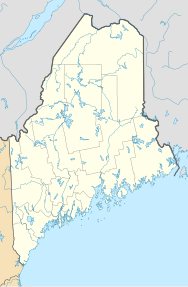Hollis, Maine
| Hollis, Maine | |
|---|---|
| Town | |

Quillcote, c. 1916
|
|
| Coordinates: 43°38′5″N 70°37′15″W / 43.63472°N 70.62083°WCoordinates: 43°38′5″N 70°37′15″W / 43.63472°N 70.62083°W | |
| Country | United States |
| State | Maine |
| County | York |
| Incorporated | 1798 |
| Government | |
| • Type | Town meeting |
| • Board of Selectmen | River Payne Roger Hicks Mike Seely |
| Area | |
| • Total | 32.99 sq mi (85.44 km2) |
| • Land | 32.01 sq mi (82.91 km2) |
| • Water | 0.98 sq mi (2.54 km2) |
| Elevation | 203 ft (62 m) |
| Population (2010) | |
| • Total | 4,281 |
| • Estimate (2012) | 4,333 |
| • Density | 133.7/sq mi (51.6/km2) |
| Time zone | Eastern (EST) (UTC-5) |
| • Summer (DST) | EDT (UTC-4) |
| Area code(s) | 207 |
| FIPS code | 23-33665 |
| GNIS feature ID | 0582523 |
| Website | hollismaine.org |
Hollis is a town in York County, Maine, United States. The population was 4,281 at the 2010 census. Hollis is a rural bedroom community of Portland and is part of the Portland–South Portland–Biddeford, Maine metropolitan statistical area.
The town of Hollis was originally called Little Falls Plantation, which also encompassed all of the town of Dayton and a small part of Limington, namely the area south of the Little Ossipee River. It was bought in 1664 by Major William Phillips from Hobinowell and Mogg Hegon, sagamores of the local Abenaki Indians. In 1728, the Massachusetts General Court ordered that a combination trading post and blockhouse be constructed on the Saco River to conduct trade with the Native Americans. It was made crudely of logs and equipped with a cannon. Ten men and a sergeant garrisoned it.
John and Andrew Gordon tried to settle the land in 1754, but were driven away by the Native Americans. On March 27, 1781, the first recorded plantation meeting took place and Joseph Chadbourne was elected moderator. By 1790 the population had grown to 607. The first vote for state office came in 1791, when Little Falls gave John Hancock 27 votes. In 1798, Little Falls was incorporated into Phillipsburg, named in honor of Major Phillips. The first town meeting took place on September 27, 1798, at the home of Stephen Hopkinson. The moderator was Joseph Chadbourne. In 1810 a committee was put together to rename the town, headed by Colonel Isaac Lane and Captain Eben Cleaves. It was finally decided upon the name Hollis. The reasoning behind the name is not known; it is thought to have been inspired by Hollis, New Hampshire, or possibly by the Duke of Newcastle, whose family name was Holles.
...
Wikipedia

